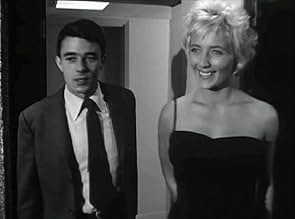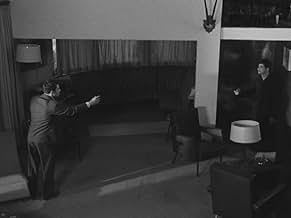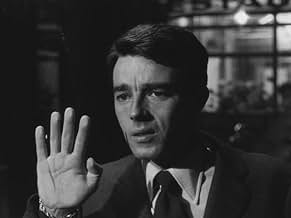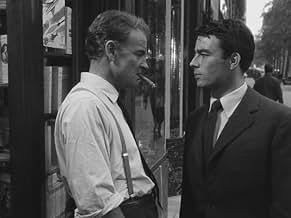VALUTAZIONE IMDb
7,2/10
3418
LA TUA VALUTAZIONE
Aggiungi una trama nella tua linguaA pair of cousins share a flat, but animosity begins to build between the two when a woman gets involved.A pair of cousins share a flat, but animosity begins to build between the two when a woman gets involved.A pair of cousins share a flat, but animosity begins to build between the two when a woman gets involved.
- Regia
- Sceneggiatura
- Star
- Premi
- 1 vittoria in totale
Recensioni in evidenza
The naive mama's boy Charles (Gérard Blain) moves to Paris to live with his debauched bon-vivant cousin Paul Thomas (Jean-Claude Brialy) in his apartment. He meets Paul's friend, the pervert pimp Jean "Clovis", who is older than them. Paul studies hard and writes daily to his mother while Paul gives frequent parties and neither studies nor goes to lectures. When Charles meets Paul's friend, the gorgeous and promiscuous Florence (Juliette Mayniel), he falls in love with her. They talk later through telephone and Florence understands the invitation of Charlie to meet her wrongly and arrives earlier at his apartment. She meets the cynical Paul and Clovis that tell her that she is a slut and will cheat Charlie when she becomes bored with him, and she ends having sex with Paul. Florence moves to the apartment to live with Paul, disturbing the attention of Charlie in his studies. When the final exams come, there is a tragedy.
"Les cousins" (1959) is the second film directed by Claude Chabrol, with the story of two cousins and depicting an empty generation. One cousin is from the countryside, naive, shy and mama's boy; the other is popular and pervert, although protecting his cousin most of the time. The beautiful Juliette Mayniel performs a key element in the story, since Charles has a crush on her, but Paul destroys their relationship since the twenty-year-old woman is promiscuous and has slept with most of his friends. However, the concentration of Charles is lost, and he fails his exam. The tragic conclusion is very sad. My vote is seven.
Title (Brazil): "Os Primos" ("The Cousins")
"Les cousins" (1959) is the second film directed by Claude Chabrol, with the story of two cousins and depicting an empty generation. One cousin is from the countryside, naive, shy and mama's boy; the other is popular and pervert, although protecting his cousin most of the time. The beautiful Juliette Mayniel performs a key element in the story, since Charles has a crush on her, but Paul destroys their relationship since the twenty-year-old woman is promiscuous and has slept with most of his friends. However, the concentration of Charles is lost, and he fails his exam. The tragic conclusion is very sad. My vote is seven.
Title (Brazil): "Os Primos" ("The Cousins")
This is more akin to the recognizable style of the "Nouvelle Vague" (with one of the characteristics being an unduly harsh quality to the cinematography, typically a prerogative of the film noir genre) than Chabrol's previous (and first) film, HANDSOME SERGE (1958).
Interestingly, while it features the same two leads – Gerard Blain and Jean-Claude Brialy – their roles are practically reversed (with the former now ingenuous and the latter world-weary), and set this time around in Paris rather than the provinces. Incidentally, the film forms a trilogy of sorts with Chabrol's other tales of amoral youth, all stemming from the vitriolic pen of the ill-fated Paul Gegauff i.e. LES BONNES FEMMES (1960) and WISE GUYS (1961).
Unfortunately, I did not watch this in the most congenial atmosphere – being a recording off French TV with subtitles in that language (it is odd that such an essential piece in both the director's canon and the influential "New Wave" filmography seems to be otherwise unavailable!). Anyway, having sensed a nod to Fellini in Chabrol's THE CHAMPAGNE MURDERS (1967), I can see definite links with this earlier effort (especially Brialy interrupting a wild party at his flat with a candle-lit recital of an epic German poem) – and which actually predates a similar occurrence in LA DOLCE VITA (1960) itself!
The film is also notable for being Stephane Audran's first collaboration (out of a total of 23!) with Chabrol; though her role is secondary, and a sluttish one at that, the actress – with hair dyed blonde – manages to make an impression nevertheless (she obviously did on her director, since they would eventually be married until 1980). Actually, the leading lady here is doe-eyed Juliette Mayniel (soon to play an unwilling donor in Georges Franju's EYES WITHOUT A FACE [1960] – ironically, one of several distinguished native directors dismissed as archaic by Godard et al), not an actress usually attached to the "New Wave" movement but who acquits herself exceedingly well under the circumstances.
Other characters within the narrative include yet another ambiguous and, in this case, much older live-in figure (who also acts as a bad influence on the heroine) and a librarian harboring almost paternal feelings for Blain. The film's abrupt tragic ending, casually treated by the director and deemed pointless by some, would seem to be suggesting that the bustle of city life spells the death of innocence (especially for someone not attuned to its grinding pace).
P.S. With this, I concluded my nearly two-month tribute to the octogenarian French master that included 27 films (all of them being first viewings!) and I regret not having had more time to revisit some of his other work – particularly A' DOUBLE TOUR (1959), LES BONNES FEMMES, TEN DAYS WONDER (1971) and INNOCENTS WITH DIRTY HANDS (1975)! For the record, I intend to pursue a similar retrospective for Jean-Luc Godard, who will himself turn 80 next December
Interestingly, while it features the same two leads – Gerard Blain and Jean-Claude Brialy – their roles are practically reversed (with the former now ingenuous and the latter world-weary), and set this time around in Paris rather than the provinces. Incidentally, the film forms a trilogy of sorts with Chabrol's other tales of amoral youth, all stemming from the vitriolic pen of the ill-fated Paul Gegauff i.e. LES BONNES FEMMES (1960) and WISE GUYS (1961).
Unfortunately, I did not watch this in the most congenial atmosphere – being a recording off French TV with subtitles in that language (it is odd that such an essential piece in both the director's canon and the influential "New Wave" filmography seems to be otherwise unavailable!). Anyway, having sensed a nod to Fellini in Chabrol's THE CHAMPAGNE MURDERS (1967), I can see definite links with this earlier effort (especially Brialy interrupting a wild party at his flat with a candle-lit recital of an epic German poem) – and which actually predates a similar occurrence in LA DOLCE VITA (1960) itself!
The film is also notable for being Stephane Audran's first collaboration (out of a total of 23!) with Chabrol; though her role is secondary, and a sluttish one at that, the actress – with hair dyed blonde – manages to make an impression nevertheless (she obviously did on her director, since they would eventually be married until 1980). Actually, the leading lady here is doe-eyed Juliette Mayniel (soon to play an unwilling donor in Georges Franju's EYES WITHOUT A FACE [1960] – ironically, one of several distinguished native directors dismissed as archaic by Godard et al), not an actress usually attached to the "New Wave" movement but who acquits herself exceedingly well under the circumstances.
Other characters within the narrative include yet another ambiguous and, in this case, much older live-in figure (who also acts as a bad influence on the heroine) and a librarian harboring almost paternal feelings for Blain. The film's abrupt tragic ending, casually treated by the director and deemed pointless by some, would seem to be suggesting that the bustle of city life spells the death of innocence (especially for someone not attuned to its grinding pace).
P.S. With this, I concluded my nearly two-month tribute to the octogenarian French master that included 27 films (all of them being first viewings!) and I regret not having had more time to revisit some of his other work – particularly A' DOUBLE TOUR (1959), LES BONNES FEMMES, TEN DAYS WONDER (1971) and INNOCENTS WITH DIRTY HANDS (1975)! For the record, I intend to pursue a similar retrospective for Jean-Luc Godard, who will himself turn 80 next December
Chabrol before he truly became Chabrol. This might seem to be one of his more 'realistic' films, with its obligatory nouvelle vague scene of Parisian freewheeling, but one of 'Les Cousins'' main themes is the disparity between reality and fantasy, and the fate of those who cannot tell between them. Just as paul turns his personality into a series of roles, his life into ritualistic tableaux, so Chabrol suffuses his realistic narrative with references to myth, fable, fairy tale, opera, and, especially, film.
'Les Cousins' plays like a counterpart to Melville's 'Les Enfants Terribles', with the same theatricality, claustrophobia, incestuousness, and mythological base; the same cinematographer, even one of Melville's actors! most interesting is the development of Chabrol's style, the lockjaw camerawork, the complex use of point of view, the puncturing of solemnity with incongruous humour (see especially the hilarious 'fish' scene).
'Les Cousins' plays like a counterpart to Melville's 'Les Enfants Terribles', with the same theatricality, claustrophobia, incestuousness, and mythological base; the same cinematographer, even one of Melville's actors! most interesting is the development of Chabrol's style, the lockjaw camerawork, the complex use of point of view, the puncturing of solemnity with incongruous humour (see especially the hilarious 'fish' scene).
Chabrol's second feature. I haven't seen his first, Le beau Serge, but this is the most French New Wave film I've seen from Chabrol. As such, it's by far my favorite. I like several of his films, but I do find even my favorites a little dry. This one is just gorgeous and it's quite a lot of fun throughout. Gerard Blain plays a provincial who is moving to Paris to go to college. He moves in with his cousin (Jean-Claude Brialy), who is himself a student. Brialy is a total party animal, spending all his free time drinking with friends and none of it studying. The two get along at first, but then a woman (Juliette Mayniel) comes between them. The film is kind of a precursor to Jules et Jim.
Chabrol's second film, made months after his first Le Beau Serge, and a more mature film director is evident. Helped, no doubt by those he gathered around him notably on script and camera, while the first film had charm and passion, this has that and more. Not only is this an interesting and intriguing tale of student life and affairs late 50s, the way it is shot opens up a whole new world of cinema. At least for the next five years this new Wave would dominate French cinema and also influence most of the world's cinema. With a fluid camera movement, jump cuts and an emphasis on 'real' people, having fun, being serious about politics, smoking all the time and having sex, cinema would, as they say never be the same again. Les Cousins is all of the above and entertains and amuses. Chabrol has complete control of the music this time, which works very well - even if it includes youngsters dancing around to Wagner! Important and enjoyable - can't say fair than that.
Lo sapevi?
- QuizTwo endings were filmed, one optimistic (the reconciliation between the two cousins), which was discarded, and the other pessimistic, which was finally chosen.
- Citazioni
Le libraire: Read Dostoyevsky. He addresses all your concerns.
- ConnessioniFeatured in Fejezetek a film történetéböl: A francia új hullám (1990)
- Colonne sonore40e Symphonie en Sol Majeur (Koechel 550) 1er movement
Music by Wolfgang Amadeus Mozart (as W.A. Mozart)
Performed by London Symphony Orchestra (as Orchestre Symphonique de Londres)
Conducted by Josef Krips (as Joseph Krips)
Disque DECCA
I più visti
Accedi per valutare e creare un elenco di titoli salvati per ottenere consigli personalizzati
- How long is The Cousins?Powered by Alexa
Dettagli
Botteghino
- Budget
- 6.000.000 FRF (previsto)
- Tempo di esecuzione1 ora 52 minuti
- Colore
- Mix di suoni
- Proporzioni
- 1.37 : 1
Contribuisci a questa pagina
Suggerisci una modifica o aggiungi i contenuti mancanti






























